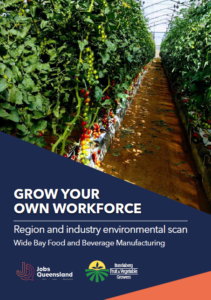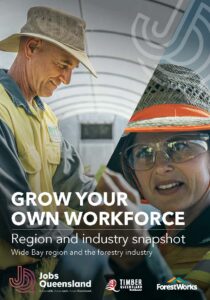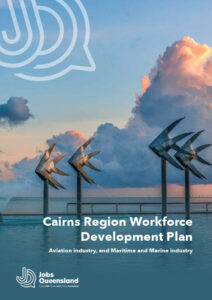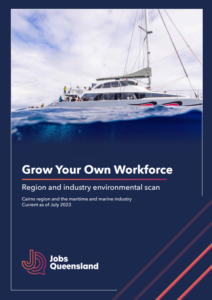As an outcome of the first Action Plan (2022-2025) under the Good people. Good jobs: Queensland Workforce Strategy 2022-2032, Jobs Queensland is partnering with regions to develop workforce plans and/or initiatives to support “grow your own” (GYO) workforces and cross-sector skills development.
The 'Grow Your Own' (GYO) Regional Workforce Program enables key local stakeholders and industry representatives to identify workforce needs and plan what skills are required to meet the needs of their sector and support their region’s economic goals. It’s all about using local workforce approaches, connected to local economic opportunities.
Projects supported through the GYO Regional Workforce Program will be action-based, addressing local solutions and driven by regional industry stakeholders.
Grow Your Own Regional Industries
Bundaberg food and beverage manufacturing sector
There are an estimated 1,139 direct jobs in Bundaberg’s food product and beverage manufacturing sector. The local food and beverage manufacturing industry plays a vital role in the region’s economy, contributing $686 million.
In partnership with Bundaberg Fruit and Vegetable Growers (BFVG), Jobs Queensland is working with key industry employers to develop a workforce plan for the Bundaberg food and beverage manufacturing sector.
The workforce plan will address gaps and provide real and tangible outcomes for employers to support their workforce needs and provide local employment opportunities for the region.

READ THE BUNDABERG FOOD AND MANUFACTURING eNVIRONMENTAL SCAN
(PDF, 88 KB)
Wide Bay forestry sector
Queensland’s forest and timber industry is the state’s third most valuable agricultural processing industry contributing an estimated $3.8 billion to the Queensland economy.
In partnership with Timber Queensland, this project will work with key industry stakeholders to understand workforce needs and develop a workforce plan that reflects net zero emissions targets and the use of transformative technology. The workforce plan will help retain and upskill the existing workforce and attract new entrants to the industry.
This project will provide local employment opportunities for the region and help build capacity to support the industry now and into the future.
As a key deliverable of this workforce planning project, an Industry and Region snapshot has been developed to provide an evidence-base prior to consultation activities in November 2023.

READ THE WIDE BAY FORESTRY SNAPSHOT
(PDF, 3 MB)
For more information, please connect with Timber Queensland at alex@timberqueensland.com.au
Grow Your Own Regional Industries
Cairns maritime, marine and aviation sectors
The Cairns maritime and marine sector supports an estimated 4,600 jobs and is set to benefit from a new workforce plan aimed at meeting the growing need for skilled workers in the region. The Port of Cairns services about 15% of Australian registered vessels and 80% of North Queensland vessels more than 15 metres, as well as international vessels.
The Cairns region hosts a vibrant and resilient aviation and aerospace industry comprising of more than 76 local businesses. As a major hub for the industry across the Asia-Pacific region, the industry is projected to grow up to 27.3% by 2026.
This project will work with local maritime, marine and aviation industry leaders to identify local workforce challenges and opportunities and support the industry to ‘grow their own’ regional workforce to meet current and future needs.
The development of a workforce plan is an important step in ensuring the region remains competitive and local workers have access to the training they need to live and work locally.

READ THE WORKFORCE PLAN
(PDF, 2.2 MB)

READ THE ENVIRONMENTAL SCAN
(PDF, 5.47 MB)
Far North water sector
Queensland’s water industry plays a vital role in supporting all water users—households, agriculture, business, and industry alike. The water sector directly affects the Queensland economy and provides essential environmental services that include managing catchments, dams, stormwater and effluent discharges.
In partnership with Far North Queensland Regional Organisation of Councils (FNQROC) and Queensland Water, this project will work with water industry leaders to bring together key information on the workforce needs of their industry and develop a clear pathway forward to address critical skills and shortages.
This project aims to develop an understanding on how to best attract, retain, reskill and upskill both the current and future workforces, who are pivotal to the delivery of a safe and consistent water supply.
Last updated 22 July 2024